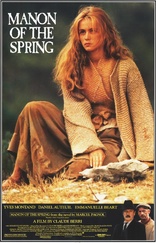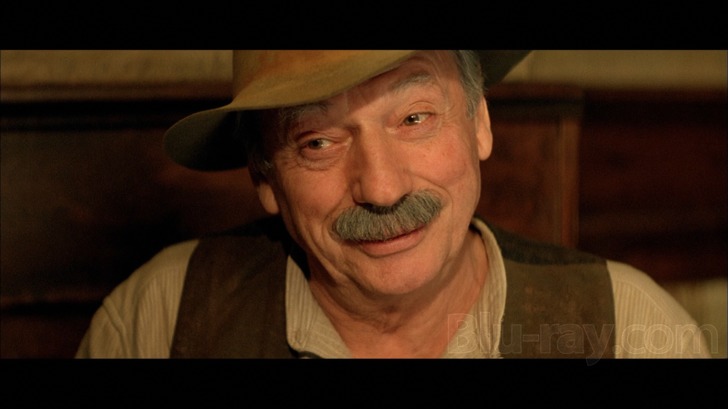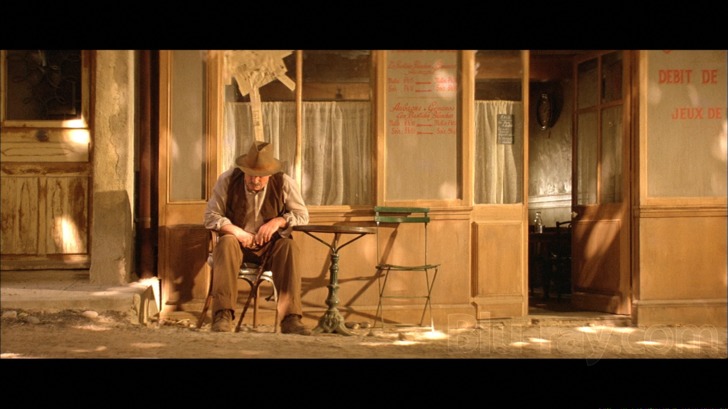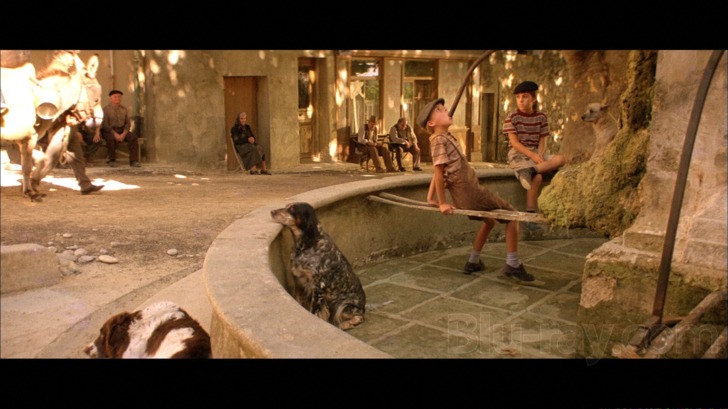Manon of the Spring Blu-ray Movie
HomeManon of the Spring Blu-ray Movie 
Manon des sourcesShout Factory | 1986 | 113 min | Rated PG | No Release Date

Price
Movie rating
7.8 | / 10 |
Blu-ray rating
| Users | 0.0 | |
| Reviewer | 4.0 | |
| Overall | 4.0 |
Overview
Manon of the Spring (1986)
This sequel to 1986's Jean de Florette stars Emmanuelle Beart as Manon (the daughter of Jean de Florette's protagonist). Manon has grown up to become a beautiful woman, a shy and resourceful shepherdess who lives in relative seclusion from the townspeople of her provencal village, haunted by the tragic death of her father (played by Gerard Depardieu in part one). An outsider, like her father, Manon stays high up in the rugged hills preferring the company of her sheep to her nearby neighbors Cèsar (Yves Montand) and Ugolin (Daniel Auteuil). One fateful day, Manon discovers the real reason why her father's spring ran dry and comes up with a powerful revenge to exact on the men responsible for her father's downfall. Manon's action changes her life forever and uncovers long-hidden family secrets that powerfully affect the local villagers.
Starring: Yves Montand, Emmanuelle Béart, Daniel Auteuil, Hippolyte Girardot, Margarita LozanoDirector: Claude Berri
| Drama | Uncertain |
| Foreign | Uncertain |
| Romance | Uncertain |
Specifications
Video
Video codec: MPEG-4 AVC
Video resolution: 1080p
Aspect ratio: 2.35:1
Original aspect ratio: 2.35:1
Audio
French: DTS-HD Master Audio 5.1 (48kHz, 24-bit)
French: DTS-HD Master Audio 2.0 (48kHz, 24-bit)
Subtitles
English
Discs
50GB Blu-ray Disc
Single disc (1 BD)
Playback
Region A (B, C untested)
Review
Rating summary
| Movie | 4.5 | |
| Video | 4.0 | |
| Audio | 4.0 | |
| Extras | 0.5 | |
| Overall | 4.0 |
Manon of the Spring Blu-ray Movie Review
. . .and not a drop to drink.
Reviewed by Jeffrey Kauffman January 26, 2015Despite rather august achievements in a variety of media, Marcel Pagnol is strangely unremembered or at least underappreciated today. A number of Pagnol’s novels like La Gloire de mon père and Le château de ma mère have been acclaimed as undisputed masterpieces, while his trilogy of plays located in the evocative port of Marseilles provided the source material for the Broadway musical Fanny (the show that gave future Carol Brady, Florence Henderson, one of her first big breaks), which in turn became the largely nonmusical film Fanny in 1961 (and later a remake by Daniel Auteuil). Pagnol’s translations of Shakespeare into French are still considered among the best ever done, even if some occasionally criticize them for being quirky. But Pagnol was also a filmmaker, and while his oeuvre doesn’t rise to the heights of his contemporaries Jean Renoir or Jean Cocteau, Pagnol created some inarguably memorable characters and stories in this medium as well. He in fact filmed all three parts of his Marseilles triptych, with Fanny and Marius appearing in 1931, followed five years later by César. In 1952 Pagnol got into skirmishes with his distributor over his four hour opus Manon des Sources, and the film was radically cut against its creator’s wishes. Though it took him about a decade after that debacle to recast his vision in a new medium, in 1963 Pagnol brought out his two part novel L'Eau des Collines, a convoluted, almost Edna Ferber-esque multigenerational saga that detailed the exploits of a scheming Provençal family whose plans to start growing carnations (carnations!) on an arid field shortly after World War I brings them into conflict with a neighbor whose property contains a supposedly secret spring. In 1986, Claude Berri filmed both parts of L’Eau des Collines simultaneously, releasing the films separately as Jean de Florette and Manon des Sources, which became Manon of the Spring in its English iteration.

(Note: It’s impossible to discuss Manon of the Spring without detailing major plot points in Jean de Florette. Those who are spoiler averse may want to skip down to the technical sections of the review, below.)
Jean de Florette ended with the apparent, if long gestating, victory of duplicitous César and Ugolin, at long last free to usurp water to feed their burgeoning flower business with both the literal and figurative collapse of Jean. That may sound like small scale villainy, and in a way it is, though the first half of this unusually riveting story proved just how involving “simple” rustics can be when they’re up to no good. What César and Ugolin don’t realize, of course, is that the table has been set—albeit again in a long gestating form—for their own demise.
A very young Manon is a tangential though central character in Jean de Florette, especially as the story in that film moves toward its tragic if inevitable denouement. In Manon of the Spring, Manon (Emmanuelle Béart) is a beautiful young woman, one who has learned to scavenge for herself, even while she nurses the trauma of her father’s death, which she had become aware was somehow orchestrated by César and Ugolin. As if fate wanted to torment him, Ugolin becomes obsessed with the grown Manon, but she obviously will have nothing to do with him, and instead has more than a passing interest in a newcomer to the village, a young teacher named Bernard Olivier (Hippolyte Girardot).
A chance discovery enables Manon to exact vengeance not just on César and Ugolin, but upon the entire village whom she sees as complicit in the death of her father. That discovery allows Manon to “turn off” the water supply to the village, and soon the superstitious natives are convinced that divine wrath is being visited upon them for their despicable behavior toward Jean, whom they never accepted for a variety of reasons, including his hunchback. Another seemingly minor incident detailed very quickly in Jean de Florette comes back to haunt César and Ugolin, and soon the two, once among the most respectable people in the local community, are social outcasts, leading to yet more tragedy.
The scales of justice are certainly rebalanced in Manon of the Spring, with Manon coming out on top just as inexorably as César and Ugolin did in Jean de Florette. But Pagnol’s mastery of storytelling doesn’t end with Manon’s victory, continuing on instead to yet one more devastating revelation that puts all that has gone before in a totally new light. It makes César an even more tragic figure than he already appeared to be, but it also offers a hint of saving grace, if only one presented to a new generation finally shorn from past tragedies.
Manon of the Spring Blu-ray Movie, Video Quality 

Manon of the Spring is presented on Blu-ray courtesy of Shout! Factory with an AVC encoded 1080p transfer in 2.35:1. My comments about this film's sibling in the Jean de Florette Blu-ray review hold largely true here as well, with a couple of minor exceptions. This film is a bit darker than Jean de Florette, and some of the early footage, notably some sequences involving Manon and the squatter family she takes up with, have lackluster shadow detail and a couple of passing instances of outright crush. The grain field is a bit more variable in this film as well, notably in some later sequences where darker scenes see some unnatural clumping and coarseness in what is otherwise an organic looking presentation. As with Jean de Florette, the sun dappled daytime scenes shot out of doors are often breathtaking, filled with a beautifully natural looking palette and excellent clarity in close-ups.
Manon of the Spring Blu-ray Movie, Audio Quality 

As with Jean de Florette, Manon of the Spring features both 2.0 and 5.1 versions of the soundtrack presented via DTS-HD Master Audio 5.1. This offering is very much in line with the prior film's, with a nicely wide array of sound effects and score in the 5.1 mix (with perhaps less of the slightly phased sound of Jean de Florette). As with the first film, dialogue is very cleanly and clearly presented, and there are no issues of any kind to report.
Manon of the Spring Blu-ray Movie, Special Features and Extras 

- Trailer (1080p; 1:48)
Manon of the Spring Blu-ray Movie, Overall Score and Recommendation 

Manon of the Spring is perhaps a trifle more basic and in some ways even a trifle silly than Jean de Florette, but the peculiar whimsy of scenes like the water returning to the village are offset by the devastating revelation that caps the film. Performances are once again authentic and wonderfully realized, and Berri and cinematographer Bruno Nuytten make the most of the ravishing countryside. Technical merits are generally strong if perhaps not quite as strong on Jean de Florette in terms of video, and Manon of the Spring comes Highly recommended.
Other editions
Manon of the Spring: Other Editions
Similar titles
Similar titles you might also like
(Still not reliable for this title)

Jean de Florette 4K
1986

Three Colors: Red
Trois couleurs: Rouge
1994

Pather Panchali 4K
পথের পাঁচালী / Song of the Little Road
1955

Bastards
Les Salauds / Slipcover in Original Pressing
2013

Children of Paradise
Les enfants du paradis
1945

Betty Blue
37°2 le matin | Director's Cut
1986

Summer Interlude
Sommarlek
1951

A Touch of Sin
天注定 / Tian zhu ding
2013

The Earrings of Madame de...
Madame de...
1953

Rust and Bone
De rouille et d'os
2012

The Rules of the Game 4K
La règle du jeu / 1959 Reconstructed Version
1939

Hiroshima mon amour
1959

Torment
L'enfer
1994

A Woman Is a Woman
Une femme est une femme
1961

Tess
1979

Life of Riley
Aimer, boire et chanter
2014

The Banishment
Izgnanie
2007

Beyond the Hills
După dealuri
2012

Mustang
2015

Broken Embraces
Los Abrazos Rotos
2009

